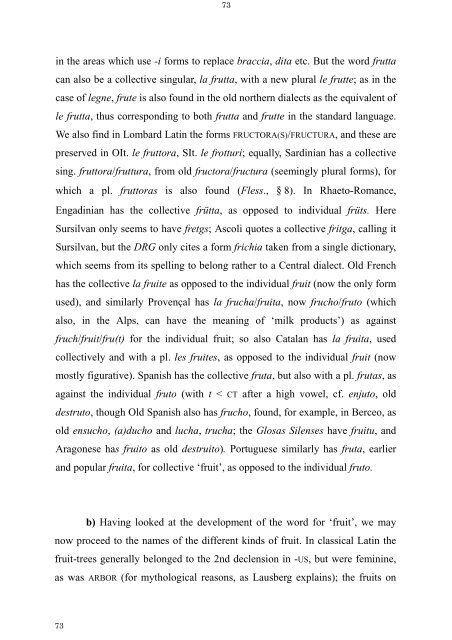The Latin Neuter Plurals in Romance - Page ON
The Latin Neuter Plurals in Romance - Page ON
The Latin Neuter Plurals in Romance - Page ON
Create successful ePaper yourself
Turn your PDF publications into a flip-book with our unique Google optimized e-Paper software.
73<br />
73<br />
<strong>in</strong> the areas which use -i forms to replace braccia, dita etc. But the word frutta<br />
can also be a collective s<strong>in</strong>gular, la frutta, with a new plural le frutte; as <strong>in</strong> the<br />
case of legne, frute is also found <strong>in</strong> the old northern dialects as the equivalent of<br />
le frutta, thus correspond<strong>in</strong>g to both frutta and frutte <strong>in</strong> the standard language.<br />
We also f<strong>in</strong>d <strong>in</strong> Lombard <strong>Lat<strong>in</strong></strong> the forms FRUCTORA(S)/FRUCTURA, and these are<br />
preserved <strong>in</strong> OIt. le fruttora, SIt. le frotturi; equally, Sard<strong>in</strong>ian has a collective<br />
s<strong>in</strong>g. fruttora/fruttura, from old fructora/fructura (seem<strong>in</strong>gly plural forms), for<br />
which a pl. fruttoras is also found (Fless., § 8). In Rhaeto-<strong>Romance</strong>,<br />
Engad<strong>in</strong>ian has the collective frütta, as opposed to <strong>in</strong>dividual früts. Here<br />
Sursilvan only seems to have fretgs; Ascoli quotes a collective fritga, call<strong>in</strong>g it<br />
Sursilvan, but the DRG only cites a form frichia taken from a s<strong>in</strong>gle dictionary,<br />
which seems from its spell<strong>in</strong>g to belong rather to a Central dialect. Old French<br />
has the collective la fruite as opposed to the <strong>in</strong>dividual fruit (now the only form<br />
used), and similarly Provençal has la frucha/fruita, now frucho/fruto (which<br />
also, <strong>in</strong> the Alps, can have the mean<strong>in</strong>g of ‘milk products’) as aga<strong>in</strong>st<br />
fruch/fruit/fru(t) for the <strong>in</strong>dividual fruit; so also Catalan has la fruita, used<br />
collectively and with a pl. les fruites, as opposed to the <strong>in</strong>dividual fruit (now<br />
mostly figurative). Spanish has the collective fruta, but also with a pl. frutas, as<br />
aga<strong>in</strong>st the <strong>in</strong>dividual fruto (with t < CT after a high vowel, cf. enjuto, old<br />
destruto, though Old Spanish also has frucho, found, for example, <strong>in</strong> Berceo, as<br />
old ensucho, (a)ducho and lucha, trucha; the Glosas Silenses have fruitu, and<br />
Aragonese has fruito as old destruito). Portuguese similarly has fruta, earlier<br />
and popular fruita, for collective ‘fruit’, as opposed to the <strong>in</strong>dividual fruto.<br />
b) Hav<strong>in</strong>g looked at the development of the word for ‘fruit’, we may<br />
now proceed to the names of the different k<strong>in</strong>ds of fruit. In classical <strong>Lat<strong>in</strong></strong> the<br />
fruit-trees generally belonged to the 2nd declension <strong>in</strong> -US, but were fem<strong>in</strong><strong>in</strong>e,<br />
as was ARBOR (for mythological reasons, as Lausberg expla<strong>in</strong>s); the fruits on









